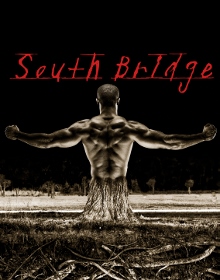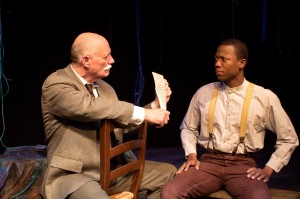SOMEWHAT SOUTH OF WHERE IT NEEDS TO BE
Chicago Dramatists’ world premiere is a tale of murder, spirituality, and heartbreak: A black man named Stranger, after being accused of the murder of his white employer, Widow Luckey, recalls to the town sheriff the events that led up to his arrest. It’s a compelling, complex story that can soar into the mythic. Southbridge has much promise and is close to working as a high-stakes post reconstruction-era drama. Interestingly, much of this story is so gripping that it is only upon reflection that some haphazard elements in production and script create ambivalence for this reviewer.
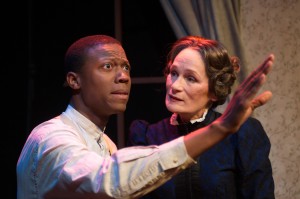 Playwright Reginald Edmund demonstrates a keen sensitivity to his characters’ psyches, leaving each one multidimensional and morally uncomfortable – some more so than others. Inspired by a true story, the people who inhabit Edmund’s world are reprehensible in their own way but sympathetic; thus, no one deserves what they get. This is entirely apt for a tale dealing so explicitly with race in the time immediately following reconstruction; as such, everything in this play’s periphery is in transition. Athens, Ohio may be a progressive town for its time, yet it is far from immunity to racism and lynch-mobs characteristic of that era’s mentality – one which the country is straining to leave behind. Upper echelons of society are beginning to adapt to the idea of black integration, but it’s still terribly difficult for a successful black businessman to get a loan. While it still seems almost commonplace at this point in time, a recounting of Widow Luckey’s experience of marital rape is shocking. And with the coming of the 20th century, Southbridge strikes a compelling balance between the historical and the fabled. Unsure of their changing world, the characters of Southbridge are driven to extremities, and no one’s hands are clean. Edmund handles this transitional period with painstaking, effective care, giving this play a certain uneasiness that truly resounds.
Playwright Reginald Edmund demonstrates a keen sensitivity to his characters’ psyches, leaving each one multidimensional and morally uncomfortable – some more so than others. Inspired by a true story, the people who inhabit Edmund’s world are reprehensible in their own way but sympathetic; thus, no one deserves what they get. This is entirely apt for a tale dealing so explicitly with race in the time immediately following reconstruction; as such, everything in this play’s periphery is in transition. Athens, Ohio may be a progressive town for its time, yet it is far from immunity to racism and lynch-mobs characteristic of that era’s mentality – one which the country is straining to leave behind. Upper echelons of society are beginning to adapt to the idea of black integration, but it’s still terribly difficult for a successful black businessman to get a loan. While it still seems almost commonplace at this point in time, a recounting of Widow Luckey’s experience of marital rape is shocking. And with the coming of the 20th century, Southbridge strikes a compelling balance between the historical and the fabled. Unsure of their changing world, the characters of Southbridge are driven to extremities, and no one’s hands are clean. Edmund handles this transitional period with painstaking, effective care, giving this play a certain uneasiness that truly resounds.
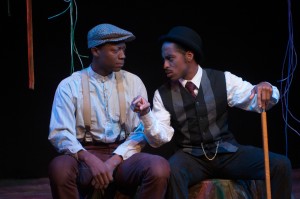 The romantic nostalgia which overlays Edmund’s script carries it a long way, managing to mostly gloss over the tropes that it tends to fall back on. And yet, they are not as effective as they might be. Metaphors that might otherwise seem hackneyed (scars, vines, etc.) simply feel as though they’re being revisited instead of recycled, which makes them appropriate but not vital. Also, major plot devices are introduced and not effectively utilized. For instance, the main character can see into people’s souls, yet this barely factors into the plot – it simply makes everyone a bit more suspicious of him, which seems odd. If someone on stage is psychic, it deserves more exposition than it gets here.
The romantic nostalgia which overlays Edmund’s script carries it a long way, managing to mostly gloss over the tropes that it tends to fall back on. And yet, they are not as effective as they might be. Metaphors that might otherwise seem hackneyed (scars, vines, etc.) simply feel as though they’re being revisited instead of recycled, which makes them appropriate but not vital. Also, major plot devices are introduced and not effectively utilized. For instance, the main character can see into people’s souls, yet this barely factors into the plot – it simply makes everyone a bit more suspicious of him, which seems odd. If someone on stage is psychic, it deserves more exposition than it gets here.
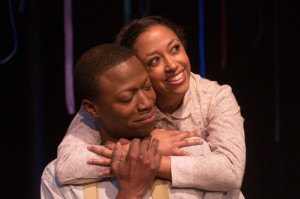 There are many memorable moments, but I would have liked Dramatists’ good production to take more risks. Michael Mroch’s scenic design, a tangle of colorful vines to represent the play’s central metaphor, doesn’t go quite far enough to capture the mythic side of Southbridge. Jeff Pines’ somewhat bare-bones lighting design could also have gestured a little further in this direction. Director Russ Tutterow elicits terrific performances from his cast: Wendy Robie as Widow Luckey is nothing short of magical, and makes all of the play’s lesser moments worthwhile; her presence is enrapturing, with a subtle wit that makes Luckey all the more tragic. Gene Cordon’s sheriff is also of note, as are Manny Buckley as Stranger and Ashley Honore as his wife, Nadia. Yet Tutterow could have capitalized on some of the most striking moments: When Stranger finally peers into Widow Luckey’s soul, we should feel as devastated by this moment as she does; Robie exquisitely expresses the pain of the moment, but Buckley sounded like a poltergeist, and the static staging causes the scene to fall drastically short of its intended impact. While this is certainly an outlier on the low end, there’s much that’s just underdone; we only get glimpses of genuine urgency, and the whole production is lacking in intensity when compared with how much is supposed to be at stake. The sense, ultimately, is that Southbridge has the makings of a truly great drama, but even with some highly recommended aspects – most notably Robie’s performance – it has yet to achieve its own aspiration for greater depth and scale.
There are many memorable moments, but I would have liked Dramatists’ good production to take more risks. Michael Mroch’s scenic design, a tangle of colorful vines to represent the play’s central metaphor, doesn’t go quite far enough to capture the mythic side of Southbridge. Jeff Pines’ somewhat bare-bones lighting design could also have gestured a little further in this direction. Director Russ Tutterow elicits terrific performances from his cast: Wendy Robie as Widow Luckey is nothing short of magical, and makes all of the play’s lesser moments worthwhile; her presence is enrapturing, with a subtle wit that makes Luckey all the more tragic. Gene Cordon’s sheriff is also of note, as are Manny Buckley as Stranger and Ashley Honore as his wife, Nadia. Yet Tutterow could have capitalized on some of the most striking moments: When Stranger finally peers into Widow Luckey’s soul, we should feel as devastated by this moment as she does; Robie exquisitely expresses the pain of the moment, but Buckley sounded like a poltergeist, and the static staging causes the scene to fall drastically short of its intended impact. While this is certainly an outlier on the low end, there’s much that’s just underdone; we only get glimpses of genuine urgency, and the whole production is lacking in intensity when compared with how much is supposed to be at stake. The sense, ultimately, is that Southbridge has the makings of a truly great drama, but even with some highly recommended aspects – most notably Robie’s performance – it has yet to achieve its own aspiration for greater depth and scale.
photos by Jeff Pines
Southbridge
Chicago Dramatists
scheduled to end on March 13, 2013
for tickets, call 312-633-0630 or visit http://www.ChicagoDramatists.org
